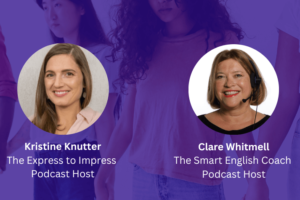Introduction
Hello! It’s Kristine here with the Express to Impress podcast. In episode seven, you learned how to ask for feedback in an interview. You learned the benefits of getting feedback, how to ask for it, and respond when you get it, and you heard common communication mistakes in interviews.
Today, you’ll learn how to ask for feedback after an interview in a way that maximizes your chances of getting a useful response.
Why Some Employers Are Hesitant to Share Feedback
To be frank with you, employers are notorious for poor communication with job seekers during the hiring process. After an interview, it’s reasonable to wonder about the outcome. If you are not invited to another interview, you may eventually receive a generic “thanks, but no thanks” email, or you may never even be told that you are out of the running. Sure, employers are juggling many job applicants, but after all your hard work, it sure seems you deserve some common decency.
Keep in mind that employers don’t want to open up a can of worms. I remember sharing the news with an applicant that we had not selected her. She was incredulous. She thought she had the job in the bag. How could anyone have been a better fit for the role? She had even bought me chocolates! Sure, it was a nice touch, and she had been a top contender for the position. But ultimately, we chose another overqualified candidate. We got off lucky. Some candidates even sue employers who don’t hire them. Because of these risks, employers seek legal counsel and develop a strategy for communicating with candidates about why they are not selected. Some employers are unwilling to take on any risk and will either not respond or only share a neutral, nonspecific reason that won’t lead to arguments.
Yes, It’s Possible to Get Feedback After an Interview
The good news is that by proactively contacting employers after an interview, you may get helpful feedback. Many employers are willing to share what a candidate did well and areas for improvement. Their company’s reputation is on the line, after all. Tucked between flowery language, you could hear feedback, such as:
- You arrived late for the interview.
- You were texting during the interview.
- You didn’t share concrete examples of conflict resolution.
There are some cases where it’s more likely you will be given detailed feedback. If you are applying for a job within your company, you will likely learn about the outcome of your interview in person and receive actionable items to improve. If you are a candidate for an internship, you are also more likely to receive detailed feedback and coaching.
One of my best interns was someone who we turned down after her initial interview. After sharing feedback as to why we didn’t choose her, she implemented our suggestions and showed up a year later for another interview – and we selected her. We saw potential and guided her on becoming a more competitive candidate – and it worked out well for her and the organization.
You’ll Likely Only Get Part of the Story
Keep in mind that even employers who share feedback will likely not tell you all of the deciding factors. If part of their decision was because of your attitude, personality, or cultural fit, you’ll probably never know.
For example, I once posted a job on Upwork and selected a few top candidates. Then, I hired them for short-term projects to see the quality of their work and their communication styles. When I told one of the candidates he wasn’t chosen, I explained that another candidate had stronger writing skills and specific certifications that could help my business grow. I didn’t tell him that throughout our interactions, he came across as “pushy” and put off by my hiring method. I doubted we would work well together. While his push back played a role in my decision, I only shared facts that would not lead to a potential argument.
Story
In the story section of this episode, we’ll look at an actual response one my clients received after requesting feedback after an interview. Keep in mind that he applied for an internship, so the feedback is quite generous. I have changed all identifying details to retain the privacy of my client.
Thank you for your application for the data analyst internship position. We greatly appreciate the time and effort you made in both the written application and interview stages. However, after much consideration, we are unable to offer you the position. Here are some points of feedback regarding your performance in the interview:
It is important to have a clear idea of what you want to get out of the data analyst role and how working at our company can help you achieve this explicitly. While your answers were well constructed, you spoke too fast, and it was difficult to understand the details of your responses. It is important to elaborate specifically on the skills and experiences that are unique and beneficial to our teams. In this instance, other candidates stood out more.
Furthermore, it is important to ensure you answer all parts of the question. Using a STAR approach (Situation, Task, Action, Result) will allow us to better understand the details of your experiences since some of your examples were too vague for us to fully understand the situation you discussed.
You performed well in the case study. In this task, we wanted to get to know you better and how you respond to problems on the spot. We were impressed with the way you approached the case and the new ideas you offered.
However, after assessing each candidate’s performance holistically, we regret to inform you that on this occasion, your application has not been successful.
We encourage you to keep updated with our events and apply for any other suitable roles in the future.
Thank you again for your application, and we wish you the best of luck with your job search.
While my client was disappointed, he was relieved to learn he nailed the case study. Furthermore, he learned where to focus his attention while preparing for his next interview.
Tips
How to Ask for Feedback After an Interview
Now let’s turn our attention to how to ask for feedback after an interview. You can ask over the phone or by email. If the employer calls you and tells you that you have not been selected and does not offer feedback, here’s your chance! It’s important to be courteous, express your motivation, respect their time, and reassure them that you accept their decision. All of these gestures will make the employer feel more comfortable sharing feedback.
For example, you could say,
I appreciate you taking the time to call me with your decision. I’m always looking for opportunities to learn and grow, and I want to be a stronger candidate should future opportunities open up at your company. Would you be willing to share some feedback about my interview performance and any advice you may have? I don’t want to put you on the spot, so perhaps we could arrange a call at a time that is convenient for you. Please rest assured that I respect your decision, and I’m only seeking feedback to better myself.”
Alright, now let’s look at how you can ask for feedback after an interview by email. If you learn you are not selected to continue in the hiring process by email, you could reply by writing,
Thank you for your email and kind words, and congratulations on finding a great candidate for the job opening.
It was a pleasure meeting with your team and learning more about your company. It reaffirmed my interest in working with you in the future, and if there’s anything I can do to improve my interview performance or overall candidacy, I’d value your thoughts.
How to React to Feedback After an Interview
Once the employer gives you the feedback you asked for, then what? At that point, it’s time to continue cultivating the relationship by expressing your gratitude and reaffirming your interest in working for the employer. For example, you could say or write:
Thank you for taking the time to share your feedback and advice with me. I truly appreciate it, and I intend to implement your advice. Should there be a more appropriately suited opportunity in the future, I hope you will keep me in mind.
How to Land Your Next Job Online Video Course
Now, I want to tell you a little about my signature video course, “How to Land Your Next Job,” which required a lot of blood, sweat, and tears and a year of my life to create. Building the course gave me the chance to gather everything I know about finding and landing a job and put it all in one place. I created it because clients came to me with specific requests regarding their job search. They would say, “Hey, I really need help with my resume. I’m not getting callbacks.” Or, “I need help with interviewing. I go to first-round interviews, but I don’t advance”. Typically, the issue they pinpointed was just the tip of the iceberg.
When working with them, I often would discover many mistakes. For example, I would find they hadn’t included the right keywords in their LinkedIn profile or resume. Or, they were giving rehearsed interview responses and not connecting with the interviewer. Sometimes I would meet people who were relying too heavily on one job search method like job boards.
This course covers it all. It allows you to identify the mistakes you’re making that are holding you back from getting a job. If you’ve been trying to get a job and haven’t been successful, I recommend you do not keep applying for jobs until you identify the issues holding you back. I’ve seen too many talented professionals who become discouraged and reach out for help only after many months of applying for jobs. It’s time to take a break, re-evaluate your approach, and come up with a more strategic way of applying and interviewing for jobs. The course content about networking, small talk, and interviewing has been especially helpful for non-native English speakers.
It lasts five-hours and includes the five parts, Envisioning the Future, Preparing Application Materials, Polishing your Online Presence, Finding Jobs, and Interviewing with lessons that last 5-15 minutes. There are 19 downloads, such as resume and cover letter templates, an Interview Preparation Checklist, and dozens of common interview questions and tips to answer them.
So, what’s the verdict? Are you going to sign up for my course? I would love to be part of your journey to finding and landing a job that you love. I invite you to visit my website at express-to-impress.com to learn more, watch free lessons, and decide if you want to sign up. You can get 15% off when you use the coupon code podcast15 at the checkout.
In the next part of the episode, I’ll cover the idioms and phrases I used for people looking to build their English vocabulary.
Idioms and Phrases
To Be Frank (With You)
To be frank with you, employers are notorious for poor communication with job seekers during the hiring process.
You can use this phrase to introduce a statement which is your honest opinion, when the other person may not like it.
Out of the Running (for something)
If you are not invited to another interview, you may eventually receive a generic “thanks, but no thanks” email, or you may never even be told that you are out of the running.
This means to have no chance of succeeding or achieving something.
Common Decency
Sure, employers are juggling many job applicants, but after all your hard work, it sure seems you deserve some common decency.
Common decency refers to everyday courtesy, respect, and politeness that is expected by social convention.
Open Up a Can of Worms
Keep in mind that employers don’t want to open up a can of worms.
This idiom means to instigate a situation that will have a negative outcome.
In the Bag
She thought she had the job in the bag.
This means to be assured of a successful conclusion.
Thank you so much for listening to this episode of the Express to Impress podcast. If you found it helpful, please share it with a friend. I hope to see you next time. Bye!
Music By Lucas Knutter







13 Comments
Leave your reply.